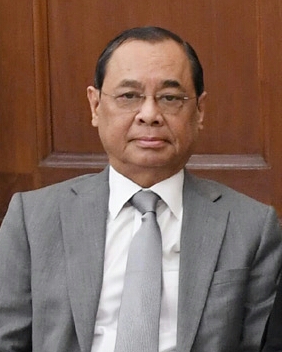Days to go...



Chief Justice of India Ranjan Gogoi is the first judge from northeast India to hold the post. CJI Gogoi hails from Assam and is the son of former Chief Minister Keshab Chandra Gogoi. He enrolled in the Bar in 1978 and practised at the Gauhati High Court. On February 28th, 2001 he was appointed as a Permanent Judge of Gauhati High Court. In 2010, he was transferred to the Punjab & Haryana High Court and he became its Chief Justice on February 12th, 2011.
In 2014, CJI Gogoi was on the two-judge Supreme Court Bench that referred the Assam NRC case to a larger Bench. However, CJI Gogoi was criticised for not recusing himself from the case. Being from Assam, he must register in the NRC and would therefore be personally affected by any judgments in the case.
On January 12th, 2018 CJI Gogoi was among four senior judges to take the unprecedented step of publicly criticising then CJI Dipak Misra. CJI Gogoi, Justices Jasti Chelameswar, Madan Lokur and Kurian Joseph expressed concern about how cases were being assigned to Benches by then CJI Misra. Their concern was that precedent was not being followed and that the Supreme Court may, as a result, lose the public’s confidence.
Following the incident, there was speculation over then CJI Misra’s nomination of CJI Gogoi to the highest post in the judiciary. Then CJI Misra followed precedent and recommended CJI Gogoi for the post on September 1st, 2018.
On April 19th, 2019 a former junior Court officer alleged that CJI Gogoi had sexually harassed her. The Supreme Court’s in-house inquiry committee, comprising Justice Bobde, Banerjee and Malhotra, found ‘no substance’ in the allegations.
Notable Judgments
CJI Gogoi has advocated procedural transparency within the judiciary. He has called for the introduction of transparent disciplinary measures for judges. He has made important contributions to electoral reform. However, some of his judgments have been controversial and widely criticised.
2019:
CBI v. Union of India; Common Cause v Union of India
CBI director Alok Verma was divested of his post at midnight through a Union Government order. A three-judge Bench led by CJI Gogoi held that the divestment of the Director without the Selection Panel’s authorisation was illegal and reinstated Alok Verma. However, within 48 hours, the Selection Panel met and concurred with the Prime Minister to transfer Alok Verma based on the Central Vigilance Commission’s non-complimentary report.
Manohar Lal Sharma v Narendra Damodardas Modi; Vineet Dhanda v UOI; Sanjay Singh v UOI; Yashwant Sinha v CBI
The three-judge Bench led by CJI Gogoi applied limited judicial review to give a clean chit to the government’s procurement of Rafale Jets. Controversy arose around the government’s claims that the deal was audited by the Comptroller and Auditor General and that the report was pending before the Public Accounts Committee. A review of the court’s judgment is pending.
2018:
Bir Singh v Delhi Jal Board
The CJI Gogoi-led Bench, in a 4:1 judgment, held that a member of the SC/ST community from one state cannot claim the benefit of reservation in government jobs or admissions in another state if their caste is not notified there.
2017:
Indira Jaising v Union of India
Senior Advocate Indira Jaising filed a petition critiquing the lack of transparency and creep of bias in the existing nomination process to the designation of the honourary title of Senior Advocate. In response, the three-judge Bench established the Permanent Committee for Designation of Senior Advocates to ensure transparency in both the Supreme Court and High Courts.
Justice C.S. Karnan v The Honourable Supreme Court of India
CJI Gogoi was on the seven-judge Bench, headed by then CJI Khehar, that charged Calcutta High Court Justice C.S. Karnan with contempt of court. Justice Karnan, previously on the Madras High Court, had notably attempted to sentence eight Supreme Court Justices to five years of rigorous imprisonment. In his judgment, CJI Gogoi wrote that Justice Karnan ought to have been disciplined at an earlier stage, but was not because the Court only had impeachment at its disposal.
2016:
Govindaswamy v State of Kerala
In the Soumya rape case, the Bench decided against charging Govidaswamy, the accused, with murder. He would have faced the death penalty if he had been found guilty of murder. In his judgment, CJI Gogoi held that the accused had not intended to kill the victim. Due to the brutal nature of the crime and the subsequent death of the victim, the public was outraged with CJI Gogoi’s position. Notably, retired Justice Katju strongly disagreed with the judgement and publicly criticized CJI Gogoi.
2015:
Common Cause v Union of India
The Bench, led by CJI Gogoi, set limits on the State’s use of public funds during elections for the promotion of individual politicians. It held that only photographs of the Prime Minister, President and Chief Justice could be displayed in government advertising. In 2016 following a review petition, the Court extended the list to include Chief Ministers, Governors and relevant cabinet ministers.
2013:
Resurgence India v Election Commission of India
The Bench set stricter requirements while assessing means to ensure that electoral candidates honestly disclose their assets, their education and any criminal antecedents. Before this judgement, candidates could leave sections of their disclosure affidavits blank.